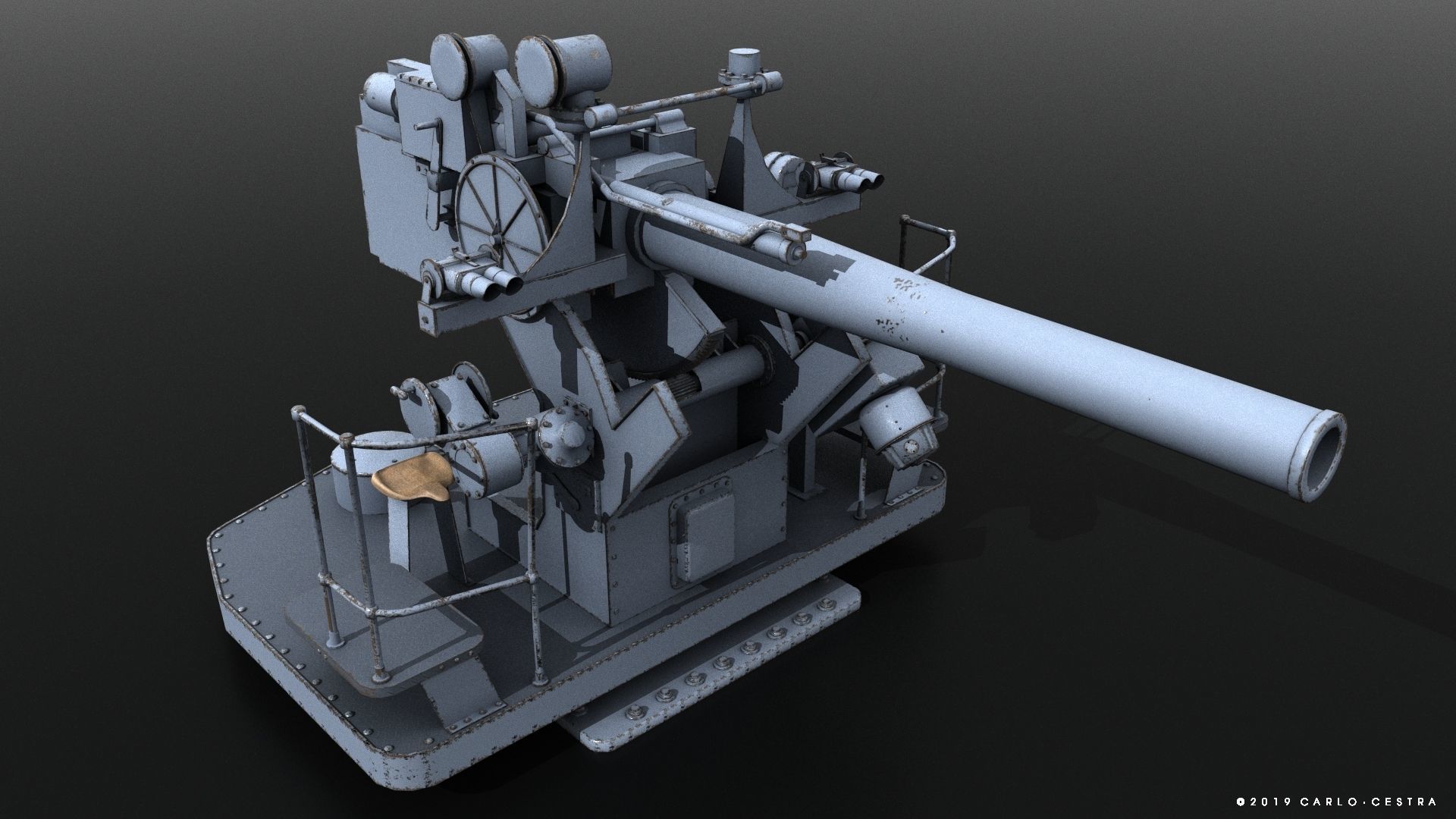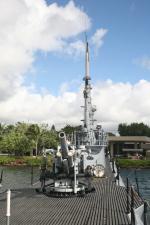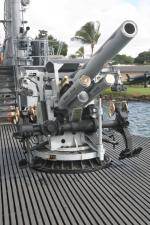Le 5"/25 caliber gun
English Transaltion
 |
Le 5"/25 caliber gun est une arme à double usage. Il est monté de manière à pouvoir être utilisés de manière efficace contre des objectifs terrestres ou aériens. Il a une portée maximale de 14.500 mètres et peut tirer dix coups par minute. Ce canon a été monté sur les sous marins américains en 1944, et était destinée à remplacer toutes les autres pièces d’artillerie sur les sous-marins. Ce fut d ailleurs le dernier canon utilisé par les Américains pour leurs sous-marins
Histoire
Les 5"/25 caliber gun ou cinq pouces de vingt-cinq calibre est le canon standard AA pour les croiseurs dit Washington de l'US Navy.
L'arme a également été montée sur les vieux cuirassés et porte avions jusqu'à ce que ils soient remplacés par le standard dual Purpose 5”/38 caliber gun
Pour l'US Navy ce canon tire un projectile de 5 pouces (127 mm) Le canon pèse environ 2 tonnes et utilise des munitions en un seul fardeau ( obus et la douille ne formant qu’un) d’un avec 4,4 kg de propergol nitrocellulose sur un poids total de l obus de 24 kg . Le projectile à une vitesse initiale ( V°) de 640m / s
Il porte jusqu’à 8352 mètres maximum avec une élévation en site de 85 degrés Le canon assez court est facile à manier de plus il est contrôlé à la main ce qui en fait un engin très facile à mettre en œuvre.
Le 5 / 38 a remplacé le 5"/25 caliber gun comme l'arme anti-aérienne au milieu des années 1930 car plus puissant notamment contre les nouveaux avions plus rapides et volant plus haut
Après le remplacement des 5"/25 caliber gun sur les vieux cuirassés en particulier ceux qui furent reconstruit après Pearl Harbour ces armes ont commencé à être montées sur les sous-marins à la fin de 1943 pour accroitre leur puissance de feu notamment contre le trafic maritime constitués de petits bateaux et sampans souvent rencontrés au cours de leur croisière
Bien que le sous-marin soit principalement une plate-forme de torpille, il ya eu des cas où l’usage de canons devient nécessaire. Si la submersion rapide à l'approche d'un avion ennemi a été la meilleure défense contre une attaque aérienne, il arrive parfois que le sous marin doive faire usage de canon anti-aérien pour se protéger si nécessaires. En outre, les attaques contre les petits navires ennemis tels que sampans ou barges peut se faire via les canons sur le pont Le plus puissant de ces canons fut le 5"/25 caliber gun monté sur affût mobile devant le Kiosque
Mais pour être utiliser sur les sous marins 5"/25 caliber gun a du été spécialement conditionné. L'ensemble du canon a été traité avec de l’acier résistant à la corrosion, afin qu'il puisse résister à une immersion répétée dans l'eau salée.
Il a été semi-automatique et il permet un tir rapide, (10 / 15 tours par minute)
L'arme équipe était composée de huit hommes:
Le Gun Captain: il ouvre la culasse et contrôle le mécanisme ou ouvre le feu après les contrôle d usage Il supervise le reste de l'équipe de pièce
Pointer: Le pointeur se trouve sur le siège de gauche, Il vise dans le plan vertical. Il pointe grâce à une pédale située à droite, qui est connectée à l'hydraulique, le système de mise à feu se trouvant sur le côté gauche de la culasse
Sight Setter: il se place directement derrière le pointeur, sur le côté gauche du canon. Il est responsable de la saisie des corrections et le signale au pointer, de sorte que la cible soit toujours alignée
First Loader: le First Loader a deux taches principales. Avant le premier tir il met la pièce en sécurité de sorte que le canon ne puisse être tirer accidentellement alors que l »équipe de pièce vaque autour. Il a également l’approvisionnement en mettant l obus en chambre
Second Loader: le Second Loader aide le premier en contrôlant la gestion des obus . il aide aussi au réapprovisionnement de la pièce.
Ammunition Handler (2): Les deux munitions Handlers sont charger de déstocker et de préparer les obus et les passer au Second loader. Ils sont équipé de gants en amiante afin de récupérer les douilles éjectées. Il existe d'autres ammunition handlers en soute qui préparent et font passer les munitions sur le pont par les ecoutilles
Voir Aussi Autres Photoscopes See Also Others Walk Around
Canon Naval 5 inch/38 caliber
The 5"/25 caliber gun
The 5" 25-caliber deck gun is a dual purpose gun. It is so mounted as to be used effectively against surface craft and aircraft. It has a maximum range of 14,500 yards and can fire ten rounds per minute. This gun came into service in 1944, and was intended to replace all earlier guns on fleet submarines. This was the last deck gun used by American submarines
History
The 5"/25 caliber gun or five-inch-twenty-five-caliber ) was the standard AA gun for the cruisers Washington type of the US Navy.
The gun was also mounted on old battle ship and air craft carriers until is substitution with by the standard dual Purpose 5”/38 caliber gun
For the US Navy this gun fire a projectile 5 inches (127 mm) The gun weighed about 2 tonnes and used fixed ammunition (case and projectile handled as a single assembled unit) with a 4.4 kg charge of nitrocellulose propellant to give at the 24 kg projectile a velocity of 640m/ second
The Ceiling was (8352 meters at the maximum elevation of 85 degrees The short barrel of the 5"/25 made it much easier to train against targets. These guns were manually controlled so the short barrel and light weight made it an early favorite as an anti-aircraft gun.
The 5”/38 caliber gun replaced the 5"/25 as the anti-aircraft weapon of choice by the mid 1930s due to its better range, velocity against surface targets, and higher vertical ceiling.
After the removing of the 5"/25 guns from the old battleships especially those rebuilt after Pearl Harbor these guns began to be mounted on submarines in late 1943 for extra firepower against small boats and sampans often encountered during their cruise
While the submarine was primarily a torpedo platform, there were occasions when alternate weapons were necessary. Rapid submergence with the approach of an enemy aircraft was the best defense against an aerial attack, but when a quick dive was unable to be made, anti-aircraft guns were needed. In addition, attacks against smaller enemy vessels such as sampans or barges was also generally carried out with a sub's deck guns. The largest weapon carried aboard a US submarine was the 5 inch 25 caliber (MK40) cannon. Housed on a moveable mount, submarines located these weapons abaft of the cigarette deck.
But to be use on sub marine the 5"/25-Caliber gun was specifically redesigned. The entire gun was made of corrosion resistant steel, so that it could withstand repeated submersion in saltwater.
He was Semi-automatic and he allow a rapid firing, (10 / 15 rounds per minute)
The Mark 17 gun in the Mark 40 submarine gun mount used semi-fixed ammunition (case and projectile handled separately) and had a range of 13,260 m This gun can be elevated up to 40° and depressed 10° below the horizontal.. This cannon was capable of sending a 54 pound projectile 18,000 yards and possessed a maximum aerial range of six miles
The gun crew consisted of eight men:
Gun Captain: Opens the breech and inspects the mechanism and bore before firing to insure there are no obstructions. Supervises the rest of the gun crew
Pointer: The Pointer sits in the left hand seat, and elevates and depresses the barrel. He aims in the vertical plane. The Pointer also fires the gun by stepping down on the right pedal, which is hydraulically connected to the firing plunger on the left side of the breech
Sight Setter: The sight setter stands directly behind the Pointer, on the left side of the gun. He is responsible for entering sight corrections, so that the optical sights used by the Trainer and Pointer are adjusted to coincide with the point of aim on the target
First Loader: The First Loader has two primary responsibilities. Before the first shot, he manually sets the safety, so that the gun cannot be accidentally fired while the Loader or other gun crew member is behind the breech, and releases the safety when the gun is ready to fire. He also physically loads the gun, shoving the shell into the breech
Second Loader: The Second Loader assists the First Loader, taking the shell from Ammunition Handlers and passing it to him.
Ammunition Handler (2): The two Ammunition Handlers receive the shells, still in their storage tubes, remove them from the tubes, and pass the shell to the Second Loader. One, wearing asbestos gloves, catches the cases as they are ejected, so that they can be returned to the arsenal for reloading. There are additional ammunition handlers in the magazine and in the after battery compartment, who pass the shells up through the ammunition scuttle














.jpg)
.jpg)
.jpg)
